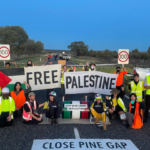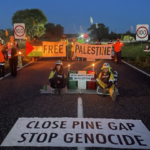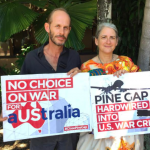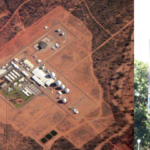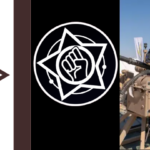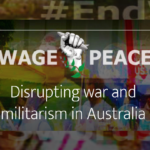Pine Gap Protest Activists Face Court Over Highlighting US Base’s Role in Gaza Genocide
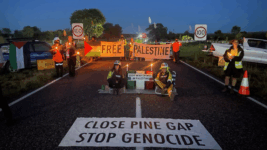
Peace activists Carmen Escobar Robinson and Tommy Walker are set to appear in Alice Springs Local Court again on 23 and 24 September 2025, in relation to summary offences that they were slapped with in respect of their second direct action blocking the road into Pine Gap: the joint US-Australia signals intelligence surveillance base, which is located in the Red Centre of the continent.
The 27 November 2023 direct action that prevented about 100 Pine Gap employees from entering the second most important US surveillance base that morning, involved 50-odd activists, comprising of Arrernte Traditional Owners, local health workers and community members, with social justice group Mparntwe for Falastin coordinating the demonstration.
Unsurprisingly, these actions were motivated by the genocide in Gaza, which is being perpetrated by Israel and commenced the month prior to the November 2023 Pine Gap road blockage action, which highlighted that the base located on Arrernte Country, 18 kilometres southwest of Mparntwe-Alice Springs, is definitely sharing intel on Gaza with the US, and this is then passed on to Israel.
For their troubles in raising the alarm in respect of this nation’s complicity in the commission of genocide against the Palestinians of Gaza, Robinson and Walker were facing charges of loitering, causing a hazard on the road and blocking the use of a public road. The case is taking place over two days and the defendants have expert witnesses testifying on their behalf.
The antiwar activists conducted their initial action blocking the road into Pine Gap in October 2023. The second action was spurred by revelations in Declassified Australia that involved an ex-Pine Gap employee underscoring that intelligence from the secretive US base is definitely making its way across the planet to Israel. Indeed, three of Pine Gap’s four satellites completely cover the Gaza Strip.
Sydney Criminal Lawyers spoke to the Loud Jew Collective’s Gem Walsh and Mparntwe-Alice Springs journalist Jorgen Doyle, who were involved in the Pine Gap actions, about the impact the local Palestine movement has been having, the reasons why the US base warrants closer public scrutiny, and how the aim of closing the facility is a tough call, but it’s also increasingly more plausible.
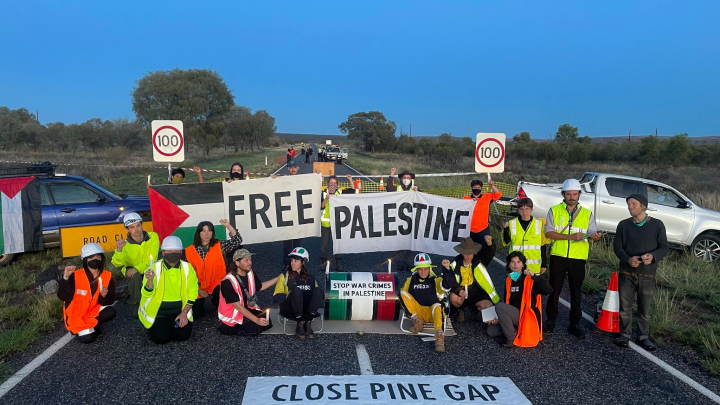
Gem, participants and supporters of the 27 November 2023 direct action that blocked the main road leading to the Pine Gap US-Australia Joint Defence Facility will be gathered outside Alice Springs Local Court on Tuesday morning, 23 September 2025, as Carmen Escobar Robinson and Tommy Walker are facing charges in relation to the action.
You participated in the November 2023 action, along with another blockade the month prior, when you were the sole person locked onto a barrel in the middle of the highway.
Why did local antiwar activists target Pine Gap for two direct actions blocking the road into the facility over October-November 2023? And what sort of impact has the broader sustained campaign against this facility been having?
Gem Walsh: We blockaded the Pine Gap spy base in our antigenocide protests because it is one of, if not the, most significant US military site on this continent.
It is the second most important US surveillance base internationally, and it operates upon unceded Arrernte Country, surveilling civilian and commercial military communications with their American signals intelligence satellites.
In addition to all their surveillance activities that they are undertaking, the base also provides geolocation intelligence to the US military, so it has this direct role in enabling the US military to locate precision targets in the battlefield and because of the close alliance between the US military and the Israeli occupying forces – or the Zionist army – this data is shared.
The data generated at Pine Gap is shared via the military and analytic relationships between the US military and the IOF. This has been shown to directly enable drone strikes and directly support and facilitate targeted assassinations, which is such a key format of the violence that we are seeing in the Gaza genocide.
So really we targeted the spy base because it is unconscionable to us that the Zionist genocide against Palestine continues to be aided and abetted from sovereign Arrernte land.
The impact of the campaign that we are engaged in against the facility and the continued activities of the facility on Arrernte land, involve a couple of elements.
The most direct impact in blocking the road to the site is that we prevented work from happening at the site, and even though there has only been two instances of blockading, which involved multiple hours each time, the cost incurred by the facility and the interruption to its work cannot be underestimated.
We do not want people on Arrernte land supporting the genocide and engaged in activities that support it.
Also, with the sustained campaign, we are contributing to the global movement that is interrogating militarism and the militarism in our societies and communities, both locally and across the continent, within the broader movement happening across the world.
The sustained campaign at Pine Gap spy base has also been providing the groundwork for organising in Mparntwe: not just in organising around Palestine but enhancing the intersections of the local struggles of Arrernte people and people from other First Nations living on Arrernte land.
You’re a member of the Loud Jew Collective, which has been a vocal participant in the pro-Palestinian protest campaign since it formed in the wake of Gaza genocide commencing in October 2023.
Gem Walsh: No, the collective didn’t form then. It formed prior to this iteration of the genocide. It formed five years ago, in 2020. It was a new iteration of a group of Jewish folks who’d been operating in the anti-Zionist space for a decade prior in different Jewish organisations in Naarm.
The local Palestinian solidarity movement has been a diverse and cohesive force mobilising over the two years of the slaughter in the Gaza Strip.
How do you consider the actions targeting Pine Gap factor into the broader Palestine resistance movement on this continent? And what sort of impact has this movement been having more broadly locally, and indeed, across the planet?
Gem Walsh: The action on 20 October 2023, the first one, was the first blockade on the continent in response to this period of the genocide that we now see in Palestine.
Every time that there is political action that comes into the consciousness of the people who live on this continent, it just adds to an environment where people are encouraged to become engaged and activated across the diversity of tactics of the movement.
We support the diversity of tactics of the movement from lobbying to direct action. We are very staunch and passionate about the need for diverse responses to the genocide.
The blockades at the spy base were nonviolent actions. They were civilian actions. They involved prayer and ritual, and in itself, that kind of contributes to the texture of the resistance movement in the way that we can bring ourselves, our lived experiences, our religiosity, spirituality and politics along to liberation work.
More broadly, the actions were in response to requests from the Palestinian resistance that we be focused and thorough in analysing the structures that support the Zionist regime, like weapons companies, militaries bases, exporters of steel used in military vehicles: all of these industries facilitate the Zionist genocide. So, the action was in response to that.
It is hard to overstate the impact the Palestinian liberation movement is having around the world. It is unmasking a lot of the ways in which we are all implicated in maintaining systems of imperialism, racial capitalism and ecological genocide.
There is this quote I like from queer Black writer and activist from Turtle Island, adrienne maree brown, and she says, “Things are not getting worse, they are getting uncovered. We must hold each other tight as we continue to pull back the veil.”
So, really the Palestinian liberation movement is uniting what has been falsely distinguished into separate justice movements.
This movement is intertwined with the Aboriginal deaths in custody campaign and that against the removal of Aboriginal children from their families. Palestinian liberation is intertwined with campaigns for climate justice.
So, the movement is highlighting that all these different justice movements are fighting against the same oppressive structures, and the success of the movement depends on dismantling these structures.
This then sets the stage for all the different iterations of liberation.
Your first Pine Gap protest in October 2023 was conducted at a time when there was great political pressure not to do anything like that. There was great pressure at that time not to say anything about stopping the Israeli onslaught or calling for a ceasefire.
Gem Walsh: Yes. Palestinians have been talking about the apartheid structures of the Israeli occupation since the beginning of the Nakba, which is still unfolding. The BDS movement has been highlighting how we have been supporting those structures for so long.
At the beginning of the genocide, there was still a lot of misinformation about the passivity of the Israeli occupation and people were horrified about the armed uprising on October 7.
But as a Jew who has been engaged in anti-Zionist learning and activism, I was lucky enough to be supported by folks in my community to be able to see what was at play at the time.
We are all indebted to the Arrernte people, who have been organising with us. We are indebted to all First Nations people, who have been organising with us.
What activists of colour around the world have really been trying to do is unmask various systems so we can see the complicity of our education system, the media and civil society institutions.
It was clear already to those living under those oppressive structures what had happened with the uprising.
The local Palestine solidarity movement has been demonised by the major parties and the mainstream media to the point that peaceful protests can be referred to as aggressive actions. This campaign to disparage the pro-Palestinian movement has been going on across the western world.
In Britain, Palestine Action has been labelled a terror organisation, while US president Trump is proposing to do the same with the Antifa movement in his country.
How would you say the demonising of the local movement has unfolded? And are there concerns that the authorities might escalate the demonisation of, or even crack down upon, the Palestine protest movement in this country?
Gem Walsh: The demonisation has unfolded in an excessive, reactionary and punitive way that is unprecedented in my lifetime of being engaged in this work.
There are definitively concerns that things are going to continue in the way that they are globally. As you said, there are these precedents being set around the ability to express solidarity with the Palestinian liberation movement.
There have been so many expressions of silencing public figures. This has included the situation with journalist Antoinette Lattouf, which had an outcome that we could be satisfied with. There was also Khaled Sabsabi, academic Randa Abdel Fattah and the pianist Jayson Gillham.
We have just seen people from all sectors of society slandered and having their livelihoods being systematically destroyed by this punitive silencing.
One of the most recent examples was the Special Envoy on Antisemitism and the program that Jillian Segal has put forth, which is based on the IHRA definition of antisemitism and all the problems around that.
The creator of the definition has even spoken out about it not being suitable for university settings, due to the capacity of the definition to silence.
We are definitely worried about the escalation of hostilities against the Palestine protest movement, and it is the mainstream media that has been one of the most significant sites of the silencing.
The media reframes any type of action for Palestine, or it refuses to report on them. It has been minimising the popularity of the movement, and even legally, there are the excessive antiprotest laws, excessive police powers and the excessive use of force, which we have seen at different tendrils of the movement, such as Disrupt Land Forces.
The responses to protests are setting new precedents for police brutality and suppression of not just our rights but our responsibility to stand up against the genocide.
Jorgen, you’re a journalist based in Mparntwe-Alice Springs with a focus on the US militarisation of northern Australia. You write the Militarism in the NT Newsletter.
The Pine Gap facility operating in the middle of the continent has long been a concern for antiwar activists, but this appears to have escalated over the course of the Gaza genocide.
Can you elaborate upon why Pine Gap operating in the middle of this country as Israel perpetrates a mass slaughter in the Gaza Strip should be of concern for the people living here?
Jorgen Doyle: Firstly, we know from the historical record that Pine Gap is sharing intelligence with the Israeli signals directorate, which then passes the intelligence on to the Israeli occupation forces.
This was done in previous wars. During the Yom Kippur War, Pine Gap shared intelligence that was reportedly integral to Israel in pushing back the Arab offensive during that war.
There are at least eight intelligence sharing agreements between the National Security Agency (NSA) of the US, which operates out of Pine Gap, and the Israeli signals directorate.
Most recently, David Rosenberg, a former Pine Gap employee, has said that Israel is definitely sharing intelligence with Israel in the context of its holocaust in Gaza.
This should be of concern to everyone on this continent, especially people living in Alice Springs, because it makes us complicit in the genocide in Gaza.
This is one of the key ways that Australia is participating in the genocide in Gaza, alongside our continued weapons exports to Israel. This certainly motivated our group’s actions. If we don’t take action, we are complicit in the slaughter.
Celeste Liddle has some good lines about Pine Gap making us complicit always and complicit from Arrernte lands, and there has been enough slaughter on Arrernte lands. So, now it’s time to stop the slaughter being enabled via Arrernte lands.
So, those revelations from ex-Pine Gap employee Rosenberg, is that the information that was revealed in a Declassified Australia article?
Jorgen Doyle: Yes, it was an article published by journalist Peter Cronau in Declassified Australia in November 2023, which was certainly a factor in Mparntwe for Falastin undertaking the direct action that same month.
Has the understanding that Pine Gap is sending intelligence via the US that ends up with Israel become stronger over the time of the Gaza genocide?
Jorgen Doyle: Professor Richard Tanter did cite a Wall Street Journal article early on as Israel started to escalate the genocide, which said that US intelligence was integral to determining that Hamas supposedly uses hospitals as bases. This created a pretext to begin seizing hospitals in Gaza.
I’ve been describing the genocide as an AUKUS genocide, as a lot of fresh information has been coming out about the UK’s surveillance operations in support of Israel’s operations in Gaza, which are enabled via the UK’s Cyprus military base.
So, you’re saying intelligence is being feed to Israel from all three AUKUS powers, Australia, the UK and the US, to assist Tel Aviv in the commission of a mass slaughter and starvation program.
The NT Country Liberals government was elected to office in August 2024. Since coming to power, the Finocchiaro ministry has unleashed a law-and-order drive in the Northern Territory, which has resulted in large numbers of First Nations peoples, and in particular children, being locked up.
The comprehensive overhaul of the Territory justice system even involves arming bus inspectors with guns and allowing the public to arm itself with pepper spray.
How do you consider this development commencing almost one year into the setter colonial slaughter in Gaza?
Jorgen Doyle: Mparntwe for Falastin has been drawing those links between settler colonial logics of dehumanisation, dispossession and control on this continent with the same logic that is operating in Gaza, since we have been taking action over the last two years.
A lot of parallels can be drawn. Matt Paterson was the mayor of Alice Springs until recently. He was a full-time employee of Amentum while he was mayor, and Amentum is the US military contractor that runs Pine Gap.
Paterson was working full time for that facility at the same time that he was calling for the Australian Army to be deployed to the streets of Alice Springs supposedly to deal with a youth crime surge.
So, Paterson was working for one of the largest US military contractors, while at the same time calling for the Australian Army to be deployed on young Aboriginal kids on Sky News. Paterson was doing this over the strange mainstream media platform that a mayor of Alice Springs receives.
The mayor gets this sort of media attention as this town is so often in the spotlight and is used by reactionary forces on this continent to push back against land rights and to push back against Aboriginal self-determination.
The media narrative associated with the town comprises of a civilisation versus barbarism narrative.
A colleague and comrade of ours, Alyawarre Professor Kathryn Gilby, lives in Alice Springs and is heavily involved with Mparntwe for Falastin. She draws the connections between the dehumanisation of Aboriginal people and of young Aboriginal people, as it enabled the Australian Army to be deployed during the NT Intervention.
The dehumanisation and the negative narratives regarding Aboriginal people in the lead up to the failed Voice Referendum was based in Alice Springs. This campaign was then the basis for the CLP to be elected to government last year.
Decades of describing Palestinians as terrorists and describing them as barbaric has laid the groundwork for the slaughter and holocaust in Gaza.
When you mentioned youth crime rates in Mparntwe-Alice Springs you proceeded the phrase with the adverb “supposedly”, which tends to cast doubt on the legitimacy of reports regarding out of control youth crime on the ground in that town, why is that the case?
Jorgen Doyle: The narrative in the national media does not correlate at all with what is happening on the ground here, and the levels of crime involved.
There is a system of apartheid operating in the town of Alice Springs, and that needs to be acknowledged. The Aboriginal people here are living under incredible stress in crowded housing. Aboriginal people don’t see a future for themselves here and don’t feel at home in the town that they live in.
All of that needs to be acknowledged.
And lastly, you’ll be showing your support for Carmen and Tommy, who are facing summary charges of loitering, causing a hazard on the road and blocking the use of a public road, on Tuesday and Wednesday this week.
During their earlier court appearance last December, the Nautilus Institute’s Professor Richard Tanter and Nasser Mashni, president of the Australia Palestine Advocacy Network (APAN), testified as expert witnesses.
The ultimate aim of the antiwar campaign against Pine Gap, the US facility that is located on Arrernte land, is to see the surveillance installation shutdown.
So, how viable a goal is shutting down Pine Gap considering the domination the US currently has over its vassal state of Australia? And do you consider that the coming of the second US Trump administration is making that ultimate goal less viable?
Jorgen Doyle: Obviously, the goal of shutting down Pine Gap is an enormously challenging goal. It will eventually shut down, as US hegemony is declining.
So, we are in a funny situation, where the motivation for my Militarism in the NT Newsletter, which is that the US military’s boot print is intensifying radically at present across northern Australia, and this is due the Australian government recently locking us into AUKUS.
The incredible intensification of US military presence on this continent, and the entwining of the US, Australian and UK militaries, is happening at the same time that the US-Australia alliance has never been less stable and more up for grabs.
The critique and unease about the US-Australia alliance has never before been so mainstream than it is at the moment. At least in my time, it has never been so up for grabs and contested.
We have never had so many people outside the confines of the left critiquing that alliance and casting doubt on the desirability or sustainability of it.
Pine Gap looms large ìn public consciousness and really stands for the entirety of the US-Australia alliance. It is the military installation on this continent that represents this alliance.
So, it is an interesting and a pivotal moment to be contesting Pine Gap’s occupation of Arrernte Country and the violence it enables abroad.
This second Trump administration represents a huge opportunity to contest the US-Australian alliance and to see how our actions at Pine Gap are received nationally at the moment. So, it would seem that there is a much greater opportunity now to end Pine Gap than there ever was under the Biden administration.
A huge part of why the US-Australia alliance is so shaky is because of the partnership in the holocaust in Gaza.
We obviously had a year and a half of firm support from the US for the holocaust in Gaza by the Biden administration, and that is a large reason why people want US forces off this continent and want out of the alliance.
The current moment is paradoxical, as there is an intensification of the US military boot print on this continent, but with this intensification of alliance, there has never been so many people on this continent questioning that same alliance.


